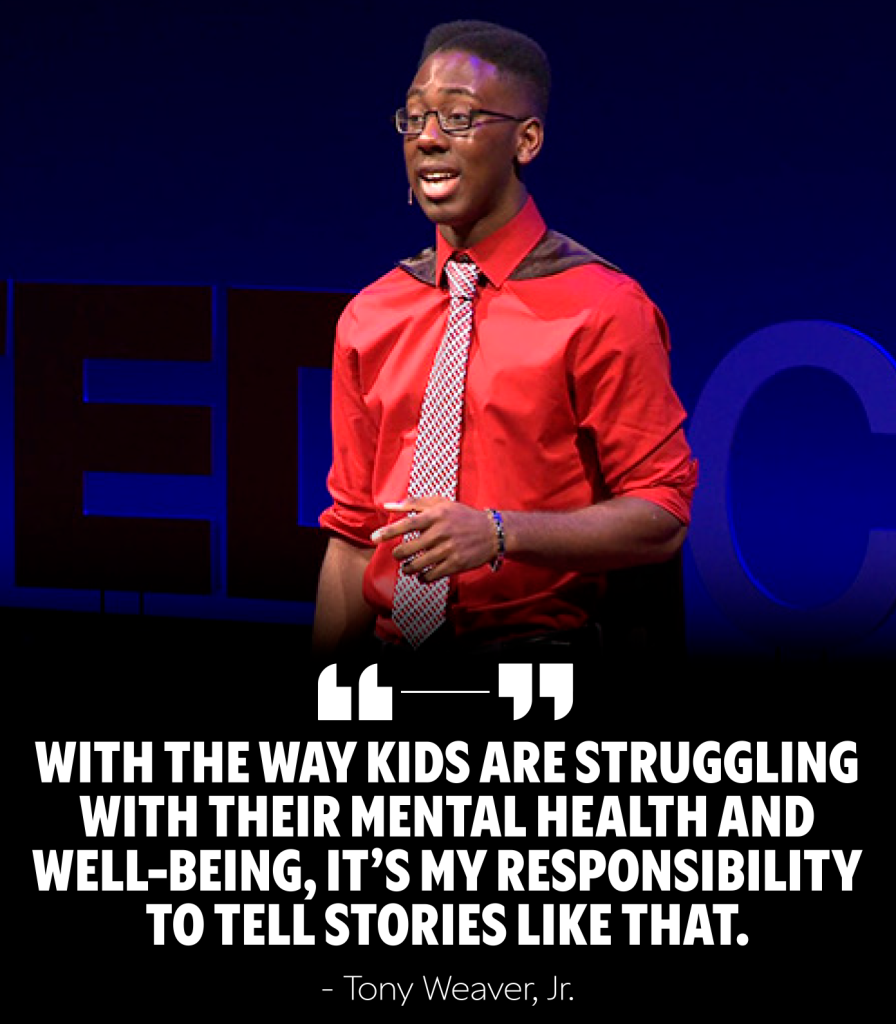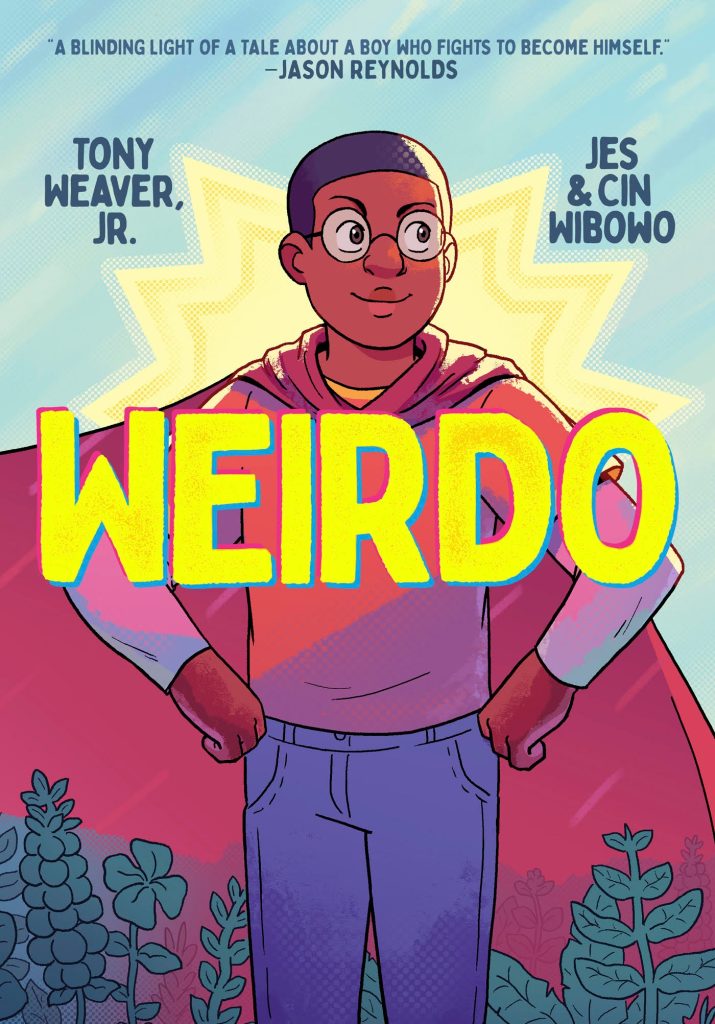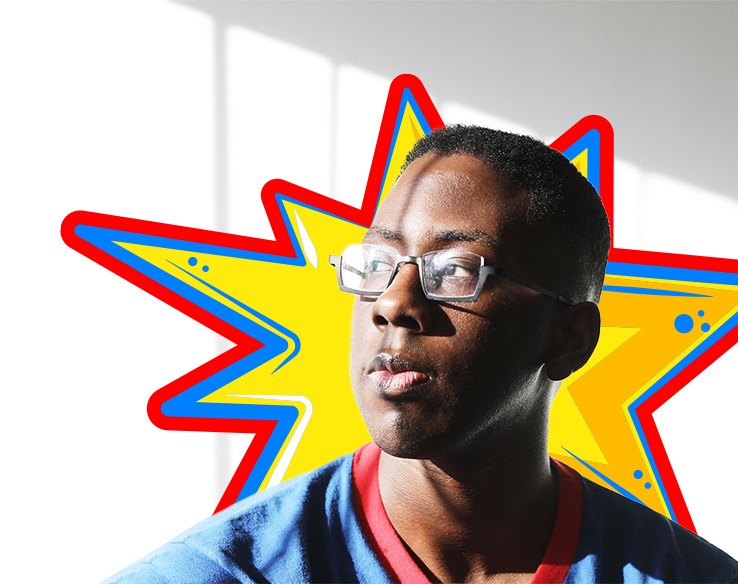by Sebastian Castro
Weirdo, by Tony Weaver Jr., was published September 17th this year. The graphic novel memoir about Weaver’s childhood is a love letter to black nerd culture and a story about mental health, friendship, and healing trauma.
The plot follows 11-year-old Tony as he navigates life as the new kid at a new school, leaving the comfort of a familiar life to pursue his parents’ dream of academic excellence, only to find himself drowning in overbearing schoolwork and relentless bullying.
Weaver wanted to write a story about a young black boy struggling with mental health because he’s found that those stories are often overlooked.
“Our mental health is not prioritized in most spaces,” Weaver said. “Some of the systems that we build around mental health do not support some of the people that are most vulnerable.”
Weaver credits Black creators Jason Reynolds and Jerry Craft for having “opened up a path” for Weaver to pursue his art on his terms.
“I stand on the shoulders of giants,” Weaver said.
Weirdo doesn’t shy away from serious issues surrounding mental health. The book includes a section dealing with self-harm. Weaver never goes into specifics of the incident, but he thought it needed to be addressed.
“By trying to protect them from it by acting like it doesn’t exist, you’re actually creating a space where they can’t talk about it, and they can’t get the help that they need,” Weaver said.
According to research by pewtrusts.org, suicide amongst Black youths aged 10-19 has increased 54% since 2018, despite overall rates of suicide trending downwards. Black kids are demonstrably less likely to receive necessary mental health counseling to address these concerns. Weaver wanted to get this conversation into mainstream discourse.
“It’s the responsibility of a storyteller to move the world forward, so I look at the world right now, specifically with the way kids are struggling with their mental health and well-being, it’s my responsibility to tell stories like that,” Weaver said.
Weirdo explores the “nitty gritty” of the healing process. According to Weaver, if his book isn’t giving young readers actionable steps, “then what’s the point?”

Weirdo also includes specific scenes with a young Tony struggling to open up to a clinical psychologist as Weaver deconstructs the stigma surrounding seeking help.
“Everybody knows how to be sad, people don’t know how to heal, people don’t know how to improve, people don’t know how to get better,” Weaver said.
Where most books end, Weirdo just gets started. There’s a point early on in the novel where Tony feels as if he’s finally started to fit in and belong, but that doesn’t mean his problems go away. Weaver stressed that he didn’t want to leave readers with a “magical” end to Tony’s problems.
“It’s important to demonstrate that healing is not a linear process,” Weaver said.
Keeping with that theme, Weaver didn’t want Tony’s antagonists to be seen as villains, but rather sympathetically.
“We often find the humanity of our protagonist at the expense of dehumanizing someone else,” Weaver said. “They’re still kids. They might be mean; they might be making mistakes… but they’re still kids”
Despite the story being told from his perspective, Weaver said it was really a story about the importance of community.
“I wanted to show people how to recognize black humanity,” Weaver said. “The story of my life is one that is defined by a strong community unit that’s with me at every step.”
The book is chock full of metaphor and pop-culture references, celebrating Weaver’s identity as a Black nerd, an identity that he feels is much more common than people think.
“All black people are nerdy in some capacity, it’s just a question of how much they’re allowed to express it,” Weaver said. He emphasized that Black boys are often discouraged from expressing their hobbies, as society will deem their interests “not Black enough.”
“For every person that’s super open about it, like me, there’s 10 people who are told ‘hey, Black people don’t do that,’” Weaver said.

BEST BOOKS OF 2024 – New York Public Library
BEST KID’S BOOKS OF 2024 – People Magazine
His inclusion of pop culture references and fantastical metaphors didn’t just serve to engage the reader but speak to a broader ideal.
“A child who is experiencing social anxiety having the courage to open their mouth and saying hello for the first time can be just as heroic and just as high stakes as a knight trying to slay a dragon,” Weaver said.
Since publication, Weaver’s already seen the impact of Weirdo on students from all races and creeds. It’s been recognized by the New York Public Library as one of the Best Books of 2024, as well as one of People Magazine’s Best Kids Books of 2024.
Weaver hopes Weirdo continues to be a part of the conversation, opening the door for young Black boys and everyone to talk about their mental health.
Weirdo 2 has been written and is currently being illustrated.

